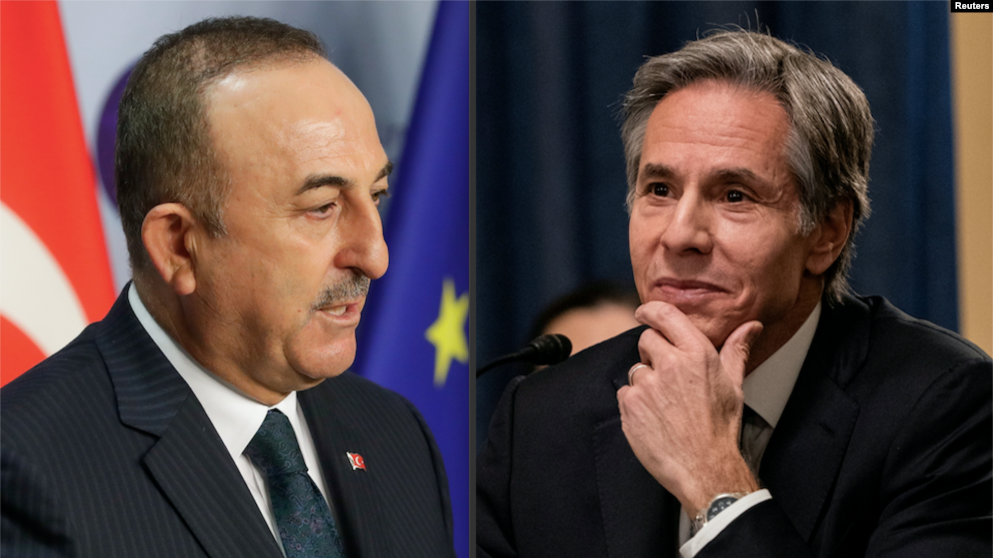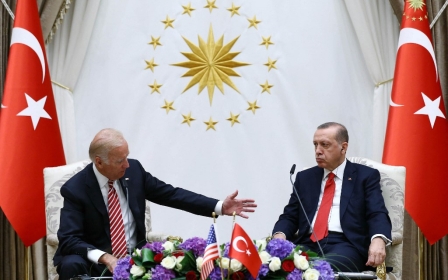US and Turkey set to meet at Nato summit in first talks under Biden

Turkish Minister of Foreign Affairs Mevlut Cavusoglu is set to hold his first face-to-face meeting with US Secretary of State Antony Blinken during the Nato summit on Tuesday and Wednesday to discuss bilateral issues and exchange views on the Afghanistan peace negotiations beginning shortly in Istanbul, multiple sources told Middle East Eye.
The bilateral meeting in Brussels will take place amid heated exchanges between the two countries on issues ranging from regional considerations to Ankara’s decision to leave a landmark treaty on violence against women.
Turkish President Recep Tayyip Erdogan last Friday slammed US President Joe Biden for calling his Russian counterpart Vladimir Putin a “killer”. Erdogan branded the description "completely unacceptable" and said it wasn't befitting for Biden to issue such a statement.
Biden, in return, issued a formal statement on Sunday criticising Turkey for withdrawing from the Council of Europe Convention on Combating Violence Against Women, also known as the Istanbul Convention, calling the move “deeply disappointing".
“Around the world, we are seeing increases in the number of domestic violence incidents, including reports of rising femicide in Turkey, the first nation to sign the convention,” he said. “This is a disheartening step backward for the international movement to end violence against women globally."
Erdogan and Biden haven’t spoken since the latter took office in January.
Even though there are multiple outstanding issues between the two countries - from Ankara’s purchase of Russian-made S-400 missile defence systems to US support for Syrian Kurdish militant groups and Turkish state lender Halkbank’s Iran sanctions-busting court case - the Biden administration is also signalling an opening with Turkey.
A source familiar with the US government’s thinking said Biden, in accordance with his publicly declared priorities, will continue to honour the “strategic partnership” with Turkey to resolve regional problems such as in Libya, where both countries are keen to curb Russia's influence.
Many in Ankara have also interpreted the US government’s offer to give Turkish leadership a mediation role in Afghanistan negotiations as part of this strategy.
S-400 sanctions cannot be resolved in a 'cute' fashion
However, US Ambassador to Turkey David Satterfield drew a line on the S-400 file last week, saying that the only move that could lift US sanctions on Turkey would be the removal of the Russian missiles from the country.
“I want to underscore here; this is not an issue which can be resolved in a tricky or cute fashion. We have the US law, which we would have to defend to the US Congress, that any resolution [that includes Turkey] is ‘not in possession of the system',” Satterfield told journalists, according to Turkish news media outlet Duvar English. "Talk about working groups or any other forms of dialogue have to address the question of ‘not in possession of the system'."
Satterfield also said that Ankara’s further acquisition of S-400s will almost certainly trigger more and stricter US sanctions. Turkish officials have been asking Washington to provide a third-way solution, since Ankara believes it is almost impossible to throw a system that cost more than $2bn in the dustbin.
A Washington-based source said the White House had been conducting a review of its Turkey policy and would shape its response to Ankara accordingly.
Both US sources suggested that the Biden administration, although it would be vocal in its condemnation of Turkey’s human rights record, such as on LGBTQ rights and freedom of expression, wouldn't allow them to get in the way in bilateral relations.
Middle East Eye propose une couverture et une analyse indépendantes et incomparables du Moyen-Orient, de l’Afrique du Nord et d’autres régions du monde. Pour en savoir plus sur la reprise de ce contenu et les frais qui s’appliquent, veuillez remplir ce formulaire [en anglais]. Pour en savoir plus sur MEE, cliquez ici [en anglais].




